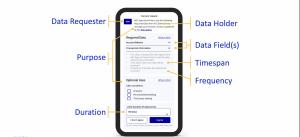Published on the 25/05/2023 | Written by Heather Wright

Getting granular with consumer data permissions…
Consumers across Australia and New Zealand are champing at the bit for greater control over how their data is being used by organisations – and they’re unhappy with the lack of guidance they’re receiving from companies.
The Visa Consumer Empowerment Study surveyed 2,000 Kiwis and 1,500 Australians – and no, those figures haven’t been transposed – highlights demand for transparency of data use and willingness to share data more openly if given more direct control over how data is used.
It found that 73 percent of both Australian and Kiwi consumers want greater control over their data. But while consumers on both sides of the Tasman are in unison on wanting greater data control, views on how well companies are doing differ.
“Failing to address those desires could suppress participation in the data economy and create a ‘confidence-divide’.”
Kiwis appear most disgruntled with 80 percent saying companies only sometimes, rarely or never educate them about how data collection works and their options to control it. Australians are feeling a little better served, but still the majority – 65 percent – say they’re not getting the information they want from companies. Both countries are less happy than global counterparts, with 56 percent of consumers worldwide sharing the sentiment.
The report shows Kiwis are a lot more hesitant than their global counterparts when it comes to data use and sharing: 39 percent say they’re ‘hesitant’ when it comes to data use and sharing – well ahead of the global average of 26 percent. Just 23 percent of Kiwis surveyed say they ‘fully understand’ or ‘mostly understand’ how their data is used when conducting digital and online activities, and only 19 percent feel in control of their data.
Global results show consumers are increasingly concerned about digital privacy, seldom fully understand how their data is being used and are seeking stronger ‘consent’ and ‘control’ – deemed to be the primary factors driving consumer comfort in data sharing, compared to factors such as branding, reputation and valued services.
And while consumers feel in the driver’s seat during the ecommerce experience, the report suggests when it comes to managing personal data, they feel in the back seat – behind business interests. Seventy-seven percent of New Zealand consumers said companies benefit more from their data than they did. Just one percent said they, as the consumer, benefited ‘significantly’ from companies using their data.
The Australian results show consumers there are more confident use of their data is having some benefits for them, but 64 percent still say it’s the businesses who are benefiting more. That’s actually a better result than seen globally, where 68 percent of individuals believe companies benefit more from using their data than they do.
So what exactly do customers want from businesses?
Both local and global results show clear demand (73 percent for NZ, 77 percent globally) for consumers to have more direct control, or the option to have more control, over data rather than companies and governments doing a better job at managing data on their behalf.
Visa says failing to address those desires could have negative impacts for businesses, including suppressing consumer participation in the data economy and creating a ‘confidence-divide’ leaving some consumers marginalised and disadvantaged.
Riaz Nasrabadi, Visa Australia, New Zealand and South Pacific head of data and risk products, says “The research findings suggest that while concerns about data use and sharing may not be the only reason that some New Zealanders choose not to engage in the digital economy, it’s clearly a contributing factor.”
Those who were classified as ‘hesitant’ when it comes to data use and sharing where also lower frequency online shoppers, with 29 percent shopping online less than once a month.
Australians, by contrast, were found to be highly engaged digital natives, with 43 percent making online purchases weekly – versus 27 percent in New Zealand – and 20 percent using over eight applications daily.
Visa tested several consent models, and found consumers were most happy – and trusting – with granular permissions that were explicit, simple, informed, unbundled, time-bound and revocable, rather than the traditional ‘take it or leave it’ T&Cs permissions.
It’s calling for an industry standard for granular consent permissioning, and outlines in the report its model, which includes opt in consent for each purpose, along with permissions for data access duration.

Visa’s granular consent experience example
Visa says it’s developing a consent specification, agnostic to any organisation, which includes guidelines on implementing granular consent, and sequence diagrams and UX guidelines, with technical APIs ‘coming soon’.
The report found that the introduction of intentional friction through use of a more granular experience could boost clarity and trust by around 35 percent, with a 16 percent impact on agreement.
Nasrabadi says introducing more consistent, transparent and intuitive permission experiences and consent models will help overcome barriers and increase consumer trust.
Visa says there are steps all businesses can take to better support customer needs.
- Offer simple, clear and consistent information
- Create transparency around what data is being collected and who it is shared with
- Provide the ability to control data use through distinct choices for different use cases
- Express time limits on data use and the ability to revoke permissions at any time



























